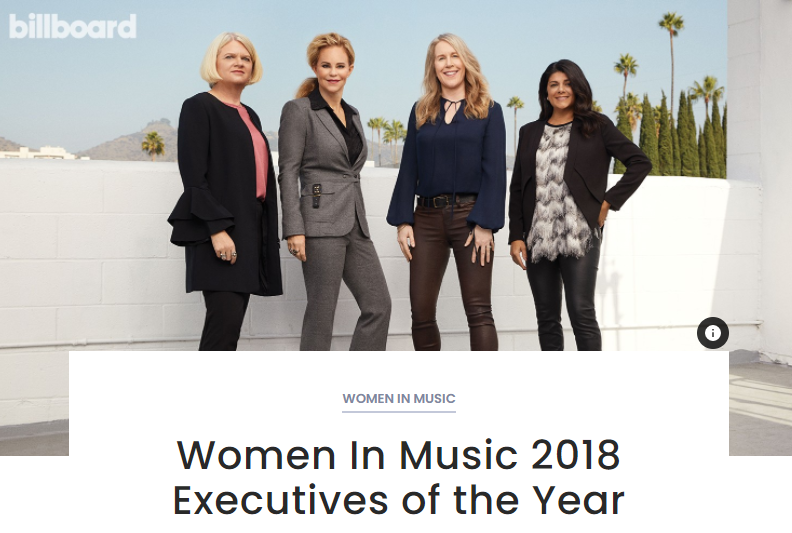Media
Women In Music 2018 Executives of the Year


On Oct. 13, 2017, Danielle Aguirre, executive vp/general counsel for the National Music Publishers’ Association (NMPA), and Dina LaPolt, who was working alongside her as legal counsel to Songwriters of North America (SONA), attended a fraught “come-to-Jesus” meeting, as the latter put it, in the Capitol Hill office of Rep. Doug Collins, R-Ga.At issue was the survival of the Orrin G. Hatch-Bob Goodlatte Music Modernization Act -- the MMA, as it’s commonly called -- legislation the two lawyers agreed was a much-needed game-changer for how artists and songwriters working in music’s digital era were compensated.Not everyone in the room felt the same way, however.
In the run-up to the Capitol Hill meeting, LaPolt says that a number of the participants were “feeling incredibly beat up by all the lawyers, lobbyists and big personalities” involved in the process and whose competing agendas threatened to crush the bill. If the MMA was to be spared, the six stakeholders who had come together in Collins’ office with under 24 hours’ notice -- including representatives from the two major performing rights organizations (PRO), ASCAP and BMI, the Nashville Songwriters Association International (NSAI) and the Digital Media Association (DiMA), which represents online retailers -- would all have to accept the bill’s material deal points.
Three hours and a host of tense moments later, Aguirre, who was running point on the legislation, had brokered a final compromise that enabled the bill to be introduced to the House of Representatives. “She’s small, but mighty,” declared LaPolt about the 5-foot-1 Aguirre, prompting laughter in the room.During the next year, the quip would become a rallying cry as Aguirre, LaPolt and two other attorneys enlisted to help -- Jacqueline Charlesworth, of counsel to Covington & Burling, and Susan Genco, co-president of Azoff MSG Entertainment -- played critical roles in getting the MMA over hurdle after daunting hurdle and before the pen of President Donald Trump, who signed the bill into law on Oct. 11, marking a watershed moment for the music industry and the songwriters that help to feed it.
Ultimately, a small army of congressional staffers, lobbyists and executives -- including NMPA president David Israelite, NSAI executive director Bart Herbison, RIAA president Mitch Glazier and general counsel Steve Marks, DiMA CEO Chris Harrison, ASCAP CEO Elizabeth Matthews, BMI president/CEO Mike O’Neill and Association of Independent Music Publishers (AIMP) managing director Alisa Coleman -- all played integral roles in making the law a reality. But as Collins, a champion of songwriters and music publishers, says, “Danielle, Dina, Jacqueline and Susan each helped propel the MMA forward at key junctures.
“Without these leaders’ talent and tenacity, the modernizing of music copyright would still seem like a fool’s errand,” he adds. “Instead, we have made it the most meaningful copyright update of the digital age.”
In recognition of their mighty achievement, the four have been named Billboard’s Women in Music Executives of the Year.The MMA’s overarching objective, in short, is to benefit songwriters and content creators by ensuring they are paid fairly and expediently for their work.
The legislation creates a blanket mechanical license and a standardized publisher- and songwriter-run collective to administer the licensing of songs played by digital service providers such as Spotify and Apple Music. It requires the DSPs to fund the creation of a comprehensive database that will match compositions to recordings and simplifies the process for copyright- and royalty-rate litigation. The law also puts unclaimed royalties in the hands of publishers and PROs, rather than DSPs and, in exchange, reduces the risk of copyright infringement for them.
Other components of the MMA include standardizing the procedure by which SoundExchange -- the nonprofit organization that collects digital performance royalties for sound recordings -- can pay producers and engineers for their work; and obligating digital and satellite radio services (like SiriusXM and Pandora) to pay royalties on pre-1972 recordings to record labels and artists.Aguirre, LaPolt and the organizations they represented began working together on what would become the MMA in early 2017. With lawsuits against streaming services over songwriter and publisher royalties sowing industry divisiveness, “we thought there was a real opportunity for a legislative solution to modernize the market,” says Aguirre.
A number of House members and senators agreed to help on the condition that the music industry cease the internecine battles that had plagued earlier lawmaking attempts.
The NMPA brought on SONA and NSAI as the initial stakeholders, then began inviting other, often conflicting industry forces to join. “If we were going to get any bill passed, we had to make a deal with DiMA and get the NAB [National Association of Broadcasters] to support what we were doing,” says LaPolt.
As the bill took shape in the spring of 2017, LaPolt suffered a near-fatal case of septic shock. While she was still in rehab, Israelite and then Collins called to say that the foundation for a bill with the DSPs was there. After being released from treatment in May, she says, “I did nothing all summer except work on the Music Modernization Act from my house,” reviewing rough drafts of the legislation and discussing them with the stakeholders, which now included DiMA, ASCAP and BMI.
With Aguirre working as the “legal quarterback,” LaPolt says the NMPA was drafting “all this amazing shit.” It had some help. To assist with the consensus bill’s language, the association brought in Charlesworth, an accomplished attorney who had extensive experience with the issues at hand. Before joining Covington, she had served as general counsel/associate register of copyrights at the U.S. Copyright Office, and prior to that, as senior vp/general counsel at the NMPA. In 2015, she authored an 1,100-page report that reviewed the Copyright Act of 1976, the cornerstone of U.S. copyright law. Some of the recommendations she made in that report “ended up, in one form or another, in the MMA,” says Charlesworth, who compared her role to working on a “giant jigsaw puzzle. Whatever we did had to fit within the framework of the existing Copyright Act,” she says.
In April, the House unanimously passed the MMA, but an uphill battle remained. In July, investment banking firm Blackstone -- which owns SESAC and mechanical rights manager The Harry Fox Agency -- proposed changes to the bill that would limit the licensing collective’s mandate, a move that threatened to cripple the legislation in the Senate.“We really thought it might be dead,” says Aguirre, who, along with Charlesworth, negotiated behind the scenes with Blackstone while LaPolt helped mount a social media campaign with songwriters that pitted SESAC against the creative community. As SESAC faced a growing public-relations nightmare and its writers threatened to leave the PRO, a compromise was reached.
Then on Sept. 14, four days before the bill was slated for a Senate vote, SiriusXM stepped up a monthslong objection to portions of the MMA dealing with pre-1972 recordings after the satellite radio company learned that compromises had been quietly given to the NAB and digital music network Music Choice in exchange for their support of the bill.
That same day, LaPolt, whom Charlesworth calls “a force of nature,” raised another PR ruckus, publishing a Variety op-ed calling for Liberty Media president/CEO Greg Maffei -- who chairs the boards of both SiriusXM and concert promotion behemoth Live Nation -- to resign from the latter because his MMA opposition “is diametrically opposed to [his] duties to protect artists in his position as chairman of the board of Live Nation.”
The piece caught the attention of Irving Azoff -- veteran manager of the Eagles, Christina Aguilera and other major stars, as well as the owner of the Global Music Rights PRO -- who had been following the legislation. Recalls LaPolt: “Irving calls and says, ‘Well, I would have preferred something a little less than throwing a hand grenade [at them].’”
To help reach a compromise, Azoff enlisted Genco, his company’s co-president, and on the night of Sept. 15, she took part in a teleconference with Azoff and LaPolt, who were ensconced in the Forum Club during an Eagles concert, and the RIAA’s Marks and Glazier. Genco then phoned Charlesworth, asking her to draft an amendment.On Sunday, Sept. 16, Genco brokered the basic outline of a compromise with SiriusXM,
Universal Music Group, Sony Music Entertainment and Warner Music Group while she and her family saw The War on Drugs at the Hollywood Bowl. With over 25 years of experience working for labels, including Capitol and Warner Bros., and in artist management and publishing,
Genco understood all sides of the issue and had the labels’ trust when asking them to agree to the compromise with SiriusXM.“Susan brought everyone to the table,” says LaPolt. “She’s the only one in our business that could have made those calls.”Final negotiations between SiriusXM and the labels continued right up until the Senate voted on the bill on Sept. 18. “The last amendment was written in by hand on the side of the legislation” before Sen. Lamar Alexander, R-Tenn., walked it onto the Senate floor, says Aguirre. The bill passed unanimously.
A party celebrating the law’s passage took place at City Winery in Washington, D.C., marking the only time all four women were in the same room throughout the entire process.Reflecting on the tag-team efforts, Charlesworth says, “The four of us together were a powerful force.”Additional reporting by Ed Christman.
Read on BILLBOARD here.
